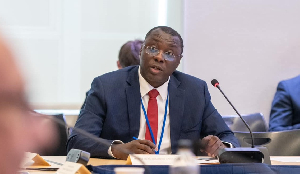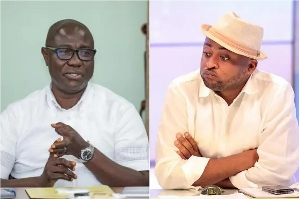Ishmael Mensah Blog of Wednesday, 18 December 2024
Source: Ishmael Mensah
The Finance Minister claims that the NPP is abandoning a robust economy.

As it gets ready to hand over power to the newly elected president, John Dramani Mahama, the departing New Patriotic Party (NPP) is allegedly leaving behind a robust economy, according to Finance Minister Dr. Mohammed Amin Adam.
Speaking to reporters on Tuesday, December 17, 2024, he made this statement.
According to Dr. Amin Adam, Ghana's economy has recovered significantly and is resilient in spite of recent domestic and international difficulties.
"We are transferring a robust economy," Dr. Amin Adam said. With the longest duration of single-digit inflation, an average GDP growth rate of 7%, and robust external balances, the first four years of this administration were characterized by outstanding success.
Despite the difficulties we encountered in 2021 and 2022, the economy has recovered robustly and more quickly than many had predicted.
The Minister cited Ghana's Gross International Reserves, which are currently at $8 billion, or 3.5 months' worth of import cover, and asserted that the outgoing government has achieved substantial progress.
He said that the economy's development trajectory has recovered to pre-COVID levels and that this is more than the $6.2 billion in reserves that the NDC gave us in 2016.
An average of 6.3% is reflected in the growth rates for 2024, which were 4.8% in the first quarter, 7% in the second, and 7.2% in the third. "This is much higher than the average growth rate of 3.4% that we inherited in 2016," he said.
He claims that the rebound was also evident in the expansion of private sector credit, which nominally increased by 28.7% in October 2024—a dramatic contrast to the 7.5% decline observed during the same time in 2023.
In October of this year, private sector credit expanded by 5.5% in real terms, after contracting by 31.6% the previous year. For the first nine months of 2024, he noted, there is a current account surplus of 2.6% of GDP and a trade balance surplus of $3.85 billion.
He said, "These are major improvements from the deficits we saw in 2016, including a current account deficit of 6.6% of GDP and a trade balance deficit of $1.8 billion."
According to him, headline inflation dropped from a peak of 54% in December 2022 to 23% in November 2024. "The policies we put in place have greatly stabilized prices and lessened the misery Ghanaians suffered, even though inflation is still high.
From GH₵807.79 billion in September 2024 to GH₵761.01 billion in October 2024, the total public debt dropped by GH₵46.8 billion. In order to ensure long-term debt sustainability, this reduction reduced the debt-to-GDP ratio from 79.2% to 74.6%, and we are on track to further lower it to 55% in net present value terms. He denied claims that the nation was bankrupt. These claims were what he called "propaganda."
He claimed that compared to when the NPP took power in 2016, Ghana's economic foundation is stronger. In order to maintain this recovery and guarantee that Ghana's debt sustainability goals are fulfilled, we trust the future administration will carry on with the policies we have put in place.














